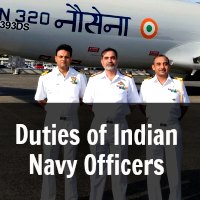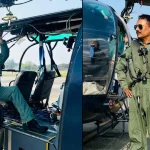If you are applying for Indian navy officers entry or going to attend Navy SSB interview in the near future, then you must know the duties of various Indian navy branches. Like if you are applying for Indian navy pilot and observer entry then you must know the key role they play in Indian navy, it will always help you in SSB during personal interview. Below we have divided the various branches of Indian navy and the officers coming under these branches, you could find the detailed explanation of Indian navy officer duties and their roles.
Executive Branch of Indian Navy
- General Service Officer: As an Executive Officer, you will be both working and fighting the ship. It means you will be a vital part of the complex system that manages the ship and also uses the ship as an instrument of tactical warfare. You will learn to have a good understanding of your ship’s capabilities and limitations and be able to turn them to your advantage. It is for this reason that an Executive Officer alone can aspire for the command of a naval ship. Executive Officers are trained in specialisations like anti-submarine warfare, navigation, communications, gunnery, logistics, diving and hydrography. One could also opt for the air or submarine arm. Within the branch, your promotional chances are not affected by your choice of specialisation. For instance, the Commanding Officer of a destroyer could have been a pilot and that of a guided missile frigate, a submarine specialist. Our specialist schools in Kochi constantly update your knowledge & sharpen your skills for greater responsibilities.
- Hydrographic Officer: Executive Officers can specialise in hydrography. Hydrographic Officers are responsible for collecting information required for making the nautical charts used by the Indian Navy and other Navies around the world.
- Naval Armament Inspection Officer: These specialist officers inspect the armaments supplied to the Navy by various agencies. While they ensure the quality, safety and reliability of naval armament and stores, they are also responsible for in-house research & development leading to indigenisation. Both Permanent as well as Short Service Commissioned officers serve in this cadre.
- Provost Officer: A separate cadre of Provost Officers exists to deal with policing, regulatory, and security and vigilance needs of the Navy.
- Pilot Officer: For those with an aspiration to fly in the skies, the navy needs Pilots who act as airborne tactical coordinators of marine warfare. While most Navy pilots fly ship-borne helicopters and shore based maritime reconnaissance aircraft, some elite pilots also fly fighter aircraft such as Sea Harrier or Mig 29K. Naval aircraft locate and attack enemy surface ships and submarines and take part in amphibious warfare, search and rescue, casualty evacuation etc. For this, specialised training is imparted at various places on shore and afloat units.
- Observer Officer: For those with a yearning for the skies, navy needs observers who act as airborne coordinators of maritime warfare. Observer officer operates various state of the art equipment including sonics, sonars, radars and communication equipment. Observer officer gets an opportunity to participate in all facets of naval operations onboard the ” eyes of the fleet: the maritime Patrol aircraft.
- Submarine Officer: If you enjoy the challenge of new frontiers, meet the medical standards and have an exceptional record, this is the specialisation for you. These new hi-tech war machines have awesome firepower, state-of-the art weapon control systems, computer controlled machinery and a high standard of habitability. In peace time, one major responsibility of the submarines is to train for war as effectively as possible in the knowledge that will contribute to its prevention. If you successfully complete the rigorous training, which is conducted at Visakhapatnam, you will be the proud possessor of the ‘Dolphin Badge’ and a member of a very elite arm of the Navy.
- Diving officer: Diving Officer job range from under water inspection and repair of ships to defence of Indian Navy maritime assets. This is yet another elite and challenging task specialization wherein being in the parent professional arm with sub specialization such as gunnery, Navigation, Anti-submarine warfare or else logistics, hydro, Aviation etc one can become ships diver. Alternatively one may opt to become a Diving Officer wherein one would be required to undertake a Clearance Diving Officers course and/ or a marine Commando course.
- Law Officer: A separate cadre of Law Officers also exists to deal with the legal needs of the Navy. Both Permanent as well as Short Service Commissioned officers serve in this cadre.
- Logistics Officer: A modern warship is not only a complex fighting unit, but also a mini township and community of several hundred people. These personnel have to be fed, clothed and paid, whatever may be the ship’s role. A modern warship has also to be constantly supplied with fuel, water and spares for the vast array of sophisticated equipment and machinery. At sea or on shore the Logistics Officer has a vital part to play in the technical and human aspects of the ship’s organisation. It is a job that requires exceptional managerial skills and the ability to deliver under pressure.
- Information Technology: Indian Navy provides an excellent career opportunities in the field of IT. Personnel gain hands-on experience in operations, maintenance and administration of core IT infrastructure in applications. They are exposed to R & D functions as part of standard growth profile. Naval IT setup is unique since it involves not only shore based establishments but also afloat units, which require to maintain connectivity and synchronised operations. The charter of duties of IT Officer includes following:-
- Implementation of Enterprise wide networking & software development projects.
- Management of Critical Naval networks and software applications.
- Administration of shore and on-board networks.
- Development activities with respect to cyber security products.
Engineering Branch of Indian Navy
- Engineering General Service Officer: Modern ships, submarines and aircraft are fitted with advanced technology machinery and propulsion systems. As an Engineer Officer, you will be responsible for keeping all these Hi-tech systems serviceable. Opportunities exist to work in gigantic naval dockyards and indigenous production units. In no other career is an engineer exposed to such a wide spectrum of opportunities and to keep abreast of modern developments. An Engineer Officer’s career is interspersed with technical courses upto post graduation level in India/abroad.
- Submarine Engineer Officer: The submarines are hi-tech war machines having awesome firepower, state of the art weapon control system, computer controlled machinery and high standard of habitability. Modern submarines have hi tech engineering equipment as well as the propulsion system. As submarine Engineer officer, you will be responsible for keeping these systems serviceable. Submarine Engineer officer could also get opportunities to work in Naval Dockyards and Submarine building units. On successful of the rigorous training conducted at different training establishments, Submarine Engineering officer will be proud processor of “Dolphin Badge” and become member of a very elite arm of the Navy
- Naval Construction Officer: You can also join in the Naval Architecture Cadre of the Engineering Branch. The Indian Navy today employs the largest pool of trained Naval Architects in India. A Naval Architect is involved in design, construction, quality control, repair and new construction work of naval vessels. With the Navy going for more and more sophisticated warship production within the country, the Corps of Naval Architects offers excellent opportunities to keep abreast of the advancement in ship building technology and implement your innovative ideas.
Electrical Branch of Indian Navy
- General Service: A warship is a mini floating city with an integral power generation and distribution system. In addition, complex missile systems, underwater weapons, radar and radio communication equipment form major part of a warship’s equipment. A majority of these are either computer-based or computer aided and incorporate the latest trends in electronics engineering. For a ship to be able to fight effectively, all these equipment must be kept working at peak efficiency. Electrical Officers have this responsibility and other challenging tasks. To sharpen their skills, the Navy offers excellent opportunities for post-graduate courses in India/abroad to deserving candidates. Note: Officers of the Engineering and Electrical Branches can also volunteer for the Aviation/ Submarine Arm.
- Submarine Electrical Officer: The submarines are hi-tech war machines have awesome fire power, state of the art weapon control system, computer controlled machinery and high standard of habitability. Submarine Electrical Officer will deal with computer based or computer aided weapon systems, missile system, underwater weapons, radars and radio communication equipment and ensure that all these sensitive and complex equipment are kept operational at peak efficiency. On successful completion of the rigorous training conducted at different training establishments, Submarine Electrical Officer will bw proud processor of “Dolphin Badge” and become member of a very elite arm of the Navy.
Online Test Preparation Course
Education Branch of Indian Navy
- Education Officer: Any service will be as good as the training its officers and men receive. As an Education Officer you will play a major role in the training of naval officers/sailors. Education Officers are responsible for scientific and methodical instructions, including theoretical aspects of technical subjects of all branches of the navy and also for general education. An Education Officer can specialise in almost all specialisations of the Executive Branch. In addition some officers also get specialisation in Oceanography & Meteorology.
Medical Branch of Indian Navy
- Doctors in Indian Navy: The Armed Forces Medical Services is among one of the best options available to a medical graduate in our country where there is an opportune professional environment of an exceptional order blended with an adventurous life, camaraderie, dignity and self-esteem. It offers a golden opportunity to be a part of the world’s finest service and get trained not only to be an officer but also a gentleman for life. The Armed Forces Medical Services (AFMS) promises both professional and personal growth at every stage of the career. The adventure and extra-curricular activities in the Armed forces ensure an all around development essential in today’s world. Apart from attractive pay and perks, Armed Forces offers the best in life style and professional growth. As a doctor in the Navy you will have an opportunity to learn and practice military medicine and look after the health of the men in uniform and their families both in peace and war. There are ample avenues to specialize in basic specialities and super specialities. Most of the postgraduate courses are conducted at Armed Forces Medical College (AFMC), Pune and various other teaching hospitals of the Armed Forces. However the service also offers opportunities to avail study leave at Government expense for the super-speciality courses at reputed civil institutions in India and abroad.
Hope now you can understand the various job profile in Indian navy better. Next time you are applying for Indian navy you must be knowing what you are going to do on the floor.
Read More
.png) About SSBCrack Editorial Team
About SSBCrack Editorial TeamThe Editorial Team of SSBCrack consists of a group of Professional writers and aspirants. Their main aim is to provide up to date information regarding SSB Interviews and sharing quality information about Indian Defence to help aspirants. Mail us to join our editorial team now.












